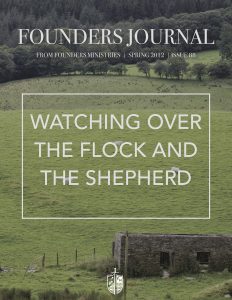“Lord Thou has formed us for Thyself, and our hearts are restless till they find rest in Thee” (Augustine).[1]
“Our relationship to God is then to us the first question: till this is settled, nothing else can be settled” (Horatius Bonar).[2]
One of the recurring subjects in the thought of Horatius Bonar (1808-1889) is that of rest. The brilliant Scottish minister, author and hymn-writer mentions it often in his various writings as well as in his hymns. I will highlight some of his observations on this theme.
Rest—The Future Dimension
As we might well expect, Bonar understood that rest had an ultimate, future dimension. This future rest is reserved for those who trust in God’s saving provision. Seen in this way, it is a promised, “remaining” rest which is part of that heavenly inheritance God has set aside for “another day” (Hebrews 4:8-9).
This future aspect of rest is also biblically portrayed as an eventual extension of that Sabbath rest symbolized in the Old Testament covenant (Exodus 31:15; Leviticus 23:3) and to be realized at a later moment (1 Peter 1:4; 2 Corinthians 5:1). In one of his hymns Horatius Bonar also referred to this as “the endless rest.”[3] After a remarkable life of service to God and others, Bonar himself entered that promised rest in 1889.
For the most part, however, Bonar treats rest not from the perspective of a heaven to be gained, but as a state of condition to be urgently pursued here and now–on this earth and in this present world. The remainder of our discussion of Bonar’s views on this subject will concentrate on this present prospect of rest.
Rest—A Settled Conviction
Rest, for Bonar, is viewed as settled conviction because of its sure foundation. It stems from a reliable gospel. It is in the pages of God’s certain Word. Bonar would learn from Scripture about Christ, his Savior and only answer to his own sin problem. “In it [the Bible] God speaks as one uttering only truth, and expecting to be believed.[4] God “has written the Scriptures,” Bonar delcared, “and sent them to us to be believed for salvation .”[5] It is “in this revelation of His character that the sinner is to find the rest he is seeking.”[6] It is the belief in the message of the gospel, he notes, which “brings pardon to the guilty” (Everlasting, 77).
That gospel message is centered in Jesus Christ and His saving work on the cross on our behalf. “From that same cross,” Bonar asserts, “springs the sinner’s rest, the sinner’s justification” (Everlasting, 23). “Acceptance and completeness in our standing before God are attributed to the cross and death of the divine Substitute” (Everlasting, 24). “The very essence of Christ’s deliverance is the substitution of Himself for us, His life for ours” (Peace, 40). It is that reconciling action by Christ which, when trusted solely, results in our forgiveness and the removal of our guilt. “The completion of the justifying work ” Bonar explains, is such “that a sinner may at once use it for pardon, for rest, for acceptance ” (Everlasting, 30).
Discovering rest–in Christ–involves a release from our own efforts to gain favor with God. “For anyone who enters God’s rest also rests from his own work ” (Hebrews 4:10). Christian trust, says Bonar, entails the cessation of work and effort, accepting instead what another has done for us (Everlasting, 40).
Rest, then, is the result of confident trust and assured resolve. Bonar at one point describes it as “the calm reception of the truth” (Everlasting, 63). “The life of a believing man is a life of known pardon a life of which the outset was the settlement of the great question between himself and God” (Everlasting, 78).
Rest—The End of the Quest
Rest of the kind that Horatius Bonar was seeking is such that it results especially in rest for the soul (Matthew 11:29). He asks specifically, “Is my soul at rest?” (Everlasting, 92). He came to see that knowledge of the gospel’s life-giving truth was “rest–rest of soul ” (Holiness, 26) coming from realized forgiveness. That kind of rest can only come from God Himself (Psalm 62:1).
In some respects, rest has certain similarities to peace, a peace that “must be the consequence of our having ascertained, upon sure evidence, the forgiving love of God” (Holiness, 32). This peace is “founded on and derived from what the cross reveals and what the cross has done” (Everlasting, 91). The removal of our condemnation because of Christ’s death is “the only effectual remedy for the deadly disease of an alienated heart and stubborn will” (Everlasting, 99). As such, any peaceful composure is the outcome of the finished work of Christ which was designed “to remove unrest from heart and conscience ” (Everlasting, 93).
Bonar also introduces a related concept, that of the “resting place.” Borrowing on scriptural imagery (Psalm 132:14; Isaiah 28:12), the term refers to something that is definite and assured, namely, the abiding presence and continuing provision of our Lord. Bonar finds that “Christ for us is our one resting place” (Holiness, 20). Christ’s reconciling and unchanging love, Bonar claimed through song, is “the resting-place.”[7] “It is Him,” he repeats, “and in His boundless love that you are to find your resting-place” (Peace, 83).
In one sense, the finding of this initiatory rest represents the end of the quest. The believer, Bonar recognized, “not only knows there is such a thing as forgiveness and eternal life, but he has found them .”[8]
From another perspective, however, the obtaining of rest marks the start of other new beginnings. Actually, it is only after one has found rest in Christ that he or she can truly begin the Christian life. Pardon, Bonar insisted, must precede acceptable performance (Holiness, 34). Consistent, right living cannot begin “until the sinner has found forgiveness and tasted liberty and has confidence towards God” (Everlasting, 97).
It is only after a person has been genuinely forgiven that he can engage in the spiritual warfare–with all its striving, setbacks and victories–that Bonar so skillfully described in his impressive classic, God’s Way of Holiness. The, and only then, can a person authentically embark on a “new life, a new joy, a new work ” (Holiness, 10). What “incentive to work,” Bonar inquires, “can be greater than an ascertained and realized forgiveness?” (Holiness, 26).
Here, with this kind of rest acquired, the keen mind and searching spirit of Horatius Bonar would meet with fulfillment. Here, the Edinburgh author-pastor would indeed find satisfying rest, one goal of his life’s quest.
Perhaps no better closing statement of this achievement of God in the believer’s life can be found than in the words of Horatius Bonar’s own hymn:
I heard the voice of Jesus say,
“Come unto Me and rest;
Lay down, thou weary one, lay down
Thy head upon My breast.”
I came to Jesus as I was,
Weary, and worn, and sad;
I found in Him a resting-place,
And He has made me glad.
1 Augustine of Hippo, Confessions, trans. T. A. Pikington (New York, NY: Liveright, 1943), I, 1:1.
2 Horatius Bonar, The Everlasting Righteousness (Unicoi, TN: Trinity Foundation, 1994), 88. Hereafter referred to as Everlasting.
3 Horatius Bonar, from the hymn “A Few More Years Shall Roll.” Elsewhere, Bonar referred to this future eventuality as the “everlasting rest” encompassing a “whole eternity.” See: Horatius Bonar, The Morning of Joy (London: James Nisbet & Co., 1871), 90, 220.
4 Horatius Bonar, “The Truthfulness of God,” The Christian Treasury, vol. 20 (1864), 277.
5 Horatius Bonar, God’s Way of Holiness (Chicago, IL: Moody Press, 1930), 27. Hereafter referred to as Holiness.
6 Horatius Bonar, God’s Way of Peace (Durham, England: Evangelical Press, 1968), 23. Hereafter referred to as Peace.
7 Horatius Bonar, from the hymn “I Hear the Words of Love.”
8 Horatius Bonar, When God’s Children Suffer (New Canaan, CT: Keats Publishing, 1981), 92. By contrast, the person not at rest is “drifting from place to place in quest of anchorage, but unable to find it.” See Horatious Bonar, Truth and Error (New York, NY: Robert Carter & Brothers, 1879), 22.
9 Horatius Bonar, from the hymn “I Heard the Voice of Jesus Say.”






















